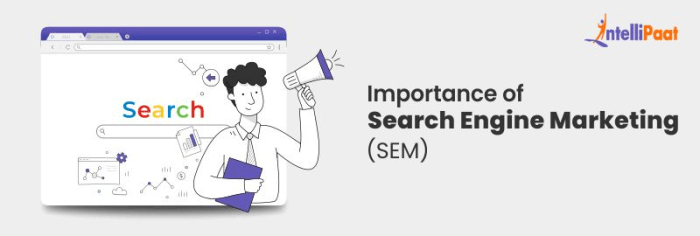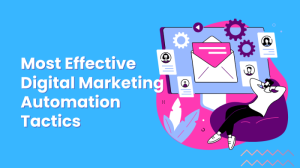
Step into the world of Search engine marketing (SEM) where online success is just a click away! Discover the power of SEM strategies in driving traffic and maximizing visibility across popular platforms like Google Ads and Bing Ads.
Uncover the secrets behind SEM’s role in e-commerce, advertising, affiliate marketing, branding, direct marketing, and internet marketing for a comprehensive understanding of its impact.
Search Engine Marketing (SEM)
Search Engine Marketing (SEM) is a digital marketing strategy focused on increasing a website’s visibility in search engine results pages (SERPs) through paid advertising. SEM is crucial for businesses looking to attract more traffic to their websites and generate leads or sales.SEM differs from Search Engine Optimization () in that is focused on optimizing a website to improve its organic search rankings, while SEM involves paying for ads to appear in search results.
Both strategies are important for a comprehensive digital marketing approach.
Importance of SEM
SEM strategies play a vital role in improving website visibility and driving targeted traffic. By bidding on s related to their products or services, businesses can ensure that their ads appear when users search for those specific terms. This targeted approach can lead to higher click-through rates and conversions.
- SEM allows businesses to reach a wider audience and target specific demographics.
- SEM provides quick results and can be easily adjusted based on performance data.
- SEM can complement efforts by filling gaps in organic search rankings.
Popular SEM Platforms
Some of the most popular SEM platforms include Google Ads (formerly known as Google AdWords) and Bing Ads. These platforms allow businesses to create text ads, display ads, and shopping ads that appear in search results and on partner websites within the ad network.
- Google Ads: Google’s advertising platform that enables businesses to create and manage ads that appear on Google’s search results pages and partner websites.
- Bing Ads: Microsoft’s advertising platform that allows businesses to create and manage ads that appear on Bing search results and partner websites.
Marketing E-Commerce
In the world of e-commerce, Search Engine Marketing (SEM) plays a crucial role in driving traffic to websites, increasing visibility, and ultimately boosting sales. Let’s explore how SEM can benefit e-commerce businesses.
Role of SEM in Promoting E-Commerce Websites
SEM involves strategies like paid search advertising and search engine optimization () to help e-commerce websites rank higher on search engine results pages (SERPs). By targeting relevant s and optimizing ad campaigns, SEM can attract more qualified leads to e-commerce sites, leading to increased traffic and potential sales.
How SEM Can Increase Sales and Conversions for Online Retailers
Increased Visibility
SEM helps e-commerce websites appear at the top of search results, making it easier for potential customers to find and visit the site.
Targeted Advertising
SEM allows businesses to reach specific audiences based on demographics, interests, and search intent, increasing the likelihood of converting leads into customers.
Improved ROI
By tracking and analyzing key metrics like click-through rates, conversion rates, and cost per acquisition, e-commerce businesses can optimize their SEM campaigns to generate higher returns on investment.
Enhanced User Experience
SEM can lead to a better user experience by driving traffic to relevant landing pages, improving site navigation, and providing valuable information to users.
Tips for Optimizing SEM Campaigns for E-Commerce Businesses
Conduct Research
Identify relevant s that your target audience is searching for and incorporate them into your ad campaigns.
Create Compelling Ad Copy
Craft engaging and persuasive ad copy that entices users to click on your ads and visit your e-commerce site.
Optimize Landing Pages
Ensure that your landing pages are user-friendly, mobile-responsive, and optimized for conversions to maximize the effectiveness of your SEM campaigns.
Monitor Performance
Regularly track and analyze key performance indicators to identify areas for improvement and refine your SEM strategies accordingly.
Success Stories of E-Commerce Companies Benefiting from SEM
- Company X saw a 50% increase in online sales after implementing a targeted SEM campaign that focused on high-converting s and optimized ad copy.
- Company Y experienced a 30% boost in website traffic and a 20% increase in conversion rates by optimizing their SEM campaigns based on user behavior and search trends.
Advertising

SEM is a powerful tool for advertising, allowing businesses to reach their target audiences effectively. By utilizing search engines like Google, Bing, and Yahoo, companies can display ads to users who are actively searching for products or services related to their business.
Advantages of Using SEM for Targeted Advertising Campaigns
- Highly targeted: SEM allows businesses to target specific s and demographics, ensuring that ads are shown to users who are most likely to be interested in their products or services.
- Cost-effective: With SEM, businesses only pay when users click on their ads, making it a cost-effective advertising option compared to traditional methods like print or TV ads.
- Measurable results: SEM provides detailed analytics and tracking capabilities, allowing businesses to measure the success of their campaigns and make data-driven decisions for optimization.
- Quick and flexible: SEM campaigns can be set up quickly and easily, and changes can be made in real-time to adjust targeting, s, and budgets.
Comparison of Traditional Advertising Methods with SEM
- Reach: Traditional advertising methods like TV or print ads have a broader reach but may not be as targeted as SEM, which can reach users actively searching for specific products or services.
- Effectiveness: SEM is often more effective in driving immediate conversions and leads, as users clicking on ads are already interested in the products or services being offered.
Tips for Creating Compelling Ad Copies for SEM Campaigns
- Use relevant s: Incorporate relevant s into your ad copy to ensure that your ads are shown to the right audience.
- Highlight unique selling points: Clearly communicate the unique benefits of your products or services to entice users to click on your ads.
- Create a strong call to action: Encourage users to take action by including a clear and compelling call to action in your ad copy.
- Test and optimize: Continuously test different ad copy variations to see what resonates best with your target audience and optimize your campaigns for better performance.
Affiliate Marketing
Affiliate marketing is a popular strategy where businesses enlist individuals or other companies to promote their products or services in exchange for a commission on sales. Integrating search engine marketing (SEM) into affiliate marketing strategies can significantly boost the reach and visibility of affiliate websites.
Role of SEM in Driving Traffic to Affiliate Websites
SEM plays a crucial role in driving traffic to affiliate websites by utilizing paid search advertising to target specific s related to the products or services being promoted. By creating targeted ads that appear on search engine results pages, affiliate marketers can attract potential customers actively searching for relevant information.
- Research: Conduct thorough research to identify the most relevant and high-converting s for your affiliate products or services.
- Ad Copy Optimization: Craft compelling ad copies that entice users to click through to the affiliate website.
- Landing Page Optimization: Ensure that the landing pages are optimized for conversions to maximize the effectiveness of SEM campaigns.
- Tracking and Analytics: Monitor the performance of SEM campaigns through tracking and analytics tools to make data-driven decisions for continuous optimization.
Best Practices for Affiliate Marketers using SEM
- Target Long-Tail s: Focus on long-tail s to capture more specific and targeted traffic.
- Use Ad Extensions: Take advantage of ad extensions to provide additional information and increase ad visibility.
- Monitor Competition: Keep an eye on competitors’ SEM strategies to stay competitive and adjust your campaigns accordingly.
- Test and Iterate: Continuously test different ad creatives, landing pages, and targeting options to optimize campaign performance.
Examples of Successful Affiliate Marketing Campaigns Leveraging SEM
One notable example of a successful affiliate marketing campaign leveraging SEM is the partnership between Amazon Associates and various bloggers. Bloggers create content around Amazon products and use SEM to drive traffic to their affiliate links, earning commissions on sales generated through their referrals. Another example is the collaboration between travel influencers and booking platforms, where influencers promote travel deals through SEM campaigns, driving traffic and conversions for the booking platform.
Branding
SEM plays a crucial role in enhancing brand visibility and awareness in the digital landscape. By strategically utilizing SEM tactics, businesses can ensure that their brand is prominently displayed to potential customers when they are searching for relevant products or services online.SEM not only boosts brand visibility but also influences brand perception and customer trust. When a brand consistently appears at the top of search engine results pages (SERPs) through paid search ads, it creates an impression of authority and reliability in the eyes of consumers.
This can significantly impact how customers perceive the brand and ultimately build trust in its offerings.
Strategies for Building Strong Brand Presence Online
- Optimization: Conduct thorough research to identify relevant terms that align with your brand and target audience. Incorporate these s into your ad copy and landing pages to improve visibility.
- Compelling Ad Copy: Craft engaging and compelling ad copy that effectively communicates your brand message and value proposition. Highlight unique selling points to differentiate your brand from competitors.
- Consistent Branding: Maintain consistency in branding elements such as logos, colors, and messaging across all SEM campaigns to reinforce brand identity and recognition.
- Targeted Campaigns: Segment your target audience based on demographics, interests, and behavior to tailor your SEM campaigns for maximum impact. Personalized messaging can strengthen brand engagement.
Examples of Brands Utilizing SEM Effectively
- Amazon: The e-commerce giant utilizes SEM to dominate search engine results for a wide range of product categories, driving traffic and sales through strategic targeting.
- Apple: Apple leverages SEM to promote its latest products and innovations, ensuring high visibility during product launches and key marketing campaigns.
- Coca-Cola: Coca-Cola uses SEM to reinforce its brand messaging and connect with consumers globally, enhancing brand awareness and engagement.
Direct Marketing
Direct marketing is a form of advertising that allows businesses to communicate directly with their target audience. Search Engine Marketing (SEM) can be a powerful tool for direct marketing purposes, as it enables businesses to target specific demographics, interests, and behaviors of potential customers.
Benefits of Targeted Advertising Through SEM
- Increased ROI: By targeting specific s and demographics, businesses can reach their ideal customers, leading to higher conversion rates and a better return on investment.
- Improved Relevance: SEM allows businesses to create personalized ads that are tailored to the needs and interests of their target audience, increasing the relevance of their marketing messages.
- Enhanced Tracking and Analytics: SEM platforms provide detailed insights into the performance of campaigns, allowing businesses to track the effectiveness of their ads and make data-driven decisions for future marketing efforts.
Tips for Creating Personalized and Engaging SEM Ads for Direct Marketing
- Use Dynamic Insertion: Incorporate the search query into your ad copy to make it more relevant and personalized to the user’s intent.
- Create Compelling Ad Copy: Write clear, concise, and compelling ad copy that highlights the benefits of your product or service to entice users to click on your ad.
- Utilize Ad Extensions: Take advantage of ad extensions like sitelinks, callouts, and structured snippets to provide additional information and encourage users to take action.
Case Studies of Successful Direct Marketing Campaigns Driven by SEM
- Company X: By leveraging SEM to target specific s related to their industry, Company X saw a 30% increase in online sales within the first month of their campaign.
- Company Y: Through personalized ad copy and targeted demographics, Company Y achieved a 15% higher click-through rate compared to their previous marketing efforts.
- Company Z: By analyzing SEM data and optimizing their campaigns, Company Z was able to reduce their cost per acquisition by 20% while increasing their conversion rate by 10%.
Internet Marketing
Internet marketing encompasses a wide range of strategies aimed at promoting products or services online. Search Engine Marketing (SEM) plays a crucial role in this digital landscape by helping businesses increase their online visibility and drive targeted traffic to their websites.
Role of SEM in Internet Marketing
SEM involves using paid advertising to appear prominently in search engine results pages. This complements other internet marketing strategies like Search Engine Optimization () and social media marketing by providing immediate visibility to a target audience actively searching for specific products or services.
SEM vs. Other Internet Marketing Channels
SEM can be more effective than other internet marketing channels in terms of delivering instant results and reaching a highly targeted audience. Unlike , which takes time to see results, SEM allows businesses to quickly appear at the top of search engine results pages for relevant s.
Tips for Integrating SEM into Internet Marketing Plan
- Conduct research to identify relevant search terms for your target audience.
- Create compelling ad copy and landing pages to encourage clicks and conversions.
- Continuously monitor and optimize your SEM campaigns to improve performance and ROI.
- Integrate SEM with other internet marketing channels for a cohesive and comprehensive strategy.
Mailing Lists

Email marketing campaigns play a crucial role in engaging with customers and prospects. When combined with Search Engine Marketing (SEM), businesses can effectively drive traffic to their landing pages for email list building. Let’s explore how SEM can be leveraged to grow and engage mailing lists.
Synergy between SEM and Email Marketing Campaigns
- SEM can help increase visibility and drive traffic to landing pages where users can sign up for mailing lists.
- By targeting relevant s and optimizing ad copy, businesses can attract users who are likely interested in subscribing to emails.
- Integrating SEM with email marketing allows for a seamless customer journey from discovery to conversion.
Strategies for Leveraging SEM to Grow Mailing Lists
- Use compelling ad copy and strong call-to-actions to encourage users to subscribe to your mailing list.
- Create dedicated landing pages with clear sign-up forms optimized for conversions.
- Segment your SEM campaigns to target specific audiences and tailor messaging to their needs and interests.
Successful Email Marketing Campaigns Boosted by SEM
- A clothing retailer saw a 20% increase in email sign-ups after running targeted SEM campaigns promoting their new arrivals.
- A travel agency experienced a 30% growth in their mailing list by using SEM to promote exclusive travel deals and discounts.
- An online course provider saw a 25% higher open rate on their emails after driving traffic to their landing pages through SEM.
Final Conclusion
As we conclude our exploration of Search engine marketing (SEM), remember that SEM is not just a tool but a game-changer in the digital marketing landscape. Harness its potential to elevate your online presence and achieve unparalleled success.
FAQ Guide
How does SEM differ from ?
SEM focuses on paid advertising to increase visibility, while emphasizes organic strategies for ranking higher in search results.
Can SEM be beneficial for small businesses?
Absolutely! SEM allows small businesses to compete with larger competitors by targeting specific audiences and maximizing their marketing budget effectively.
What are some key elements of a successful SEM campaign?
research, compelling ad copies, landing page optimization, and regular performance monitoring are essential for a successful SEM campaign.





